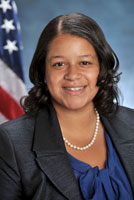Despite all the noise from progressive lawmakers, moderates in both the state senate and assembly believe they will have enough votes to roll back criminal justice reforms that Gov. Kathy Hochul and Mayor Eric Adams are requesting.
Among these are giving judges more discretion to set bail, allowing prosecutors some leeway in charging some youths 16 and 17 in adult criminal court, and addressing recent discovery laws that some argue favor rights of defendants over that of victims.

“I think something will be done on criminal justice reforms before we leave session this year,” said veteran Assemblyman Peter Abbate (D-Brooklyn). “We had a number of conferences with Assembly Speaker Carl Heastie and one just the other night. It was a good discussion. Some people were for changes and some people didn’t want the changes.”
Abbate noted that even in progressive Brooklyn there were a number of Assembly members that will likely vote to roll back criminal justice reforms including himself and Assembly Members Helene Weinstein, Steve Cymbrowitz, Jaimie Williams and Bill Colton.
There will likely be several assembly members from Long Island, Westchester and areas upstate also voting for reforms as well as Republicans across the aisle, he said.
There also seems to be discussion on the issues from the state Black, Puerto Rican, Hispanic and Asian Legislative Caucus, despite their releasing a 10-point criminal justice plan over the weekend in opposition to Hochul’s, which came out earlier this month.

Assemblywoman Michaelle Solages (D – Long Island) – the caucus chair – said their plan will focus on investing in underserved communities rather than making roll backs to bail, discovery and Raise the Age laws.
“We support making sure that we invest into the community,” Solages told PoliticsNY. “And we believe that we should end perpetual punishment of underserved communities, especially communities of color.”
The caucus’ 10-point-plan focuses on making investments in initiatives like mental healthcare services, youth programs, improving access to education for underserved communities and reducing homelessness. Solages said the plan was a culmination of several criminal justice initiatives caucus members have strongly supported in recent years.
But Solages refused to say who signed onto the plan and said the 65-member caucus never held a formal vote to approve what was ultimately included in it. Instead, they tasked a smaller group of Assembly members and state Senators with drafting the proposal, which is how the caucus works on most of its initiatives.
While there’s going to be some disagreement between such a large group of lawmakers, Solages said, they’re mostly united on the core ideas reflected in the 10-point-plan.

But at least one member, Sen. Roxanne Persaud (D-Brooklyn), said she has long spoken up for changes needed to the recent criminal justice reforms.
“What I’ve said and continue to say is no law, when it comes into place is perfect. There’s sometimes unintended consequences, and you have to address that. It’s not a direct effect of bail reform, even though it’s lumped into that. Bail reform is just a catch phrase. We need to look at the criminal justice reforms that we did and see what are the unintended consequences because there are things that need to be fixed,” said Persaud.










